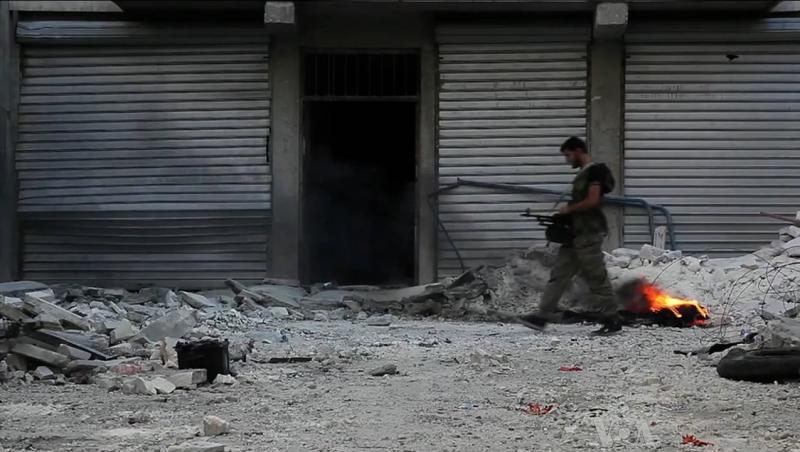A Timeline Of Chemical Weapon Allegations In Syria

But allegations of chemical weapons used by the Syrian government began as early as December 2012.
Included is a brief timeline on the U.S. stance toward the Syrian government and claims surrounding its alleged chemical weapons use.
Increased U.S. attention on Syria and chemical weapons
August 20, 2012: President Obama said during a press conference Syrian President Bashar al-Assad lost legitimacy with his people. Obama did not make any indication of U.S. military involvement in the Syrian conflict but established America's stance on the threat or use of chemical weapons in the Middle East. "A red line for us is we start seeing a whole bunch of chemical weapons moving around or being utilized," Obama said. "That would change my calculus. That would change my equation."
December 3, 2012: U.S. officials reported Syria showed signs of creating materials for chemical weapons prompting Obama to issue a second warning to Assad. "The use of chemical weapons is and would be totally unacceptable," Obama said. "And if you make the tragic mistake of using these weapons, there will be consequences, and you will be held accountable." Secretary of State Hillary Clinton echoed a similar warning. Around this time, all non-essential UN employees were pulled out of Syria.
December 8, 2012: U.S. satellite images showed Syrian chemical weapon factories began to combine the components necessary to create Sarin nerve gas. British Foreign Secretary William Hague confirms he has seen the same evidence.
First reports of chemical weapons use
December 24, 2012: Syrian rebels stationed in the city of Homs first accused the government of using chemical weapons. The U.S. disputed the rebels' claims, saying the weapons used were instead nerve agents due to reports the gas created a strong odor and was inhaled heavily. An odorless gas, Sarin only needed to be inhaled in small amounts.
March 19, 2013: Both Syrian nationals and rebels reported chemical weapons were used against each other in the city of Aleppo. Neither side's accusations were verified.
Early confirmation
April 18, 2013: Great Britain and France informed the United Nations they were in possession of evidence confirming the Syrian government conducted chemical weapon attacks in the cities of Homs, Aleppo and possibly Damascus.
April 25, 2013: U.S. Defense Secretary Chuck Hagel announced to reporters the United States believed the Syrian government used chemical weapons. A letter from the White House stated, "Our intelligence community does assess, with varying degrees of confidence, that the Syrian regime has used chemical weapons on a small scale in Syria, specifically, the chemical agent Sarin."
June 13, 2013: The U.S. intelligence community said, "100 to 150 people have died from detected chemical weapons attacks in Syria to date; however, casualty data is likely incomplete." President Obama began to consider expanding the United States' assistance to Syrian rebels beyond previous non-military levels.
Recent mounting tension and the possibility of military intervention
August 21, 2013: An emergency meeting of the U.N. Security Council was called to respond to reports of chemical weapon attacks outside the Syrian capital of Damascus. Hundreds of civilians were reportedly killed. Graphic videos were released allegedly showing victims, including children, of chemical weapons attacks, though chemical weapon use was impossible to confirm through video.
August 23, 2013: The U.S. prepositioned four Navy warships into the Mediterranean. No confirmation was made as to whether the U.S. would take military action. International aids organizations reported hospitals in the Damascus region received over 3,600 patients who showed neurotoxic symptoms.
August 24, 2013: A spokesman for the White House reported Obama and British Prime Minister David Cameron agreed to "consult closely regarding this incident, as well as possible responses by the international community to the use of chemical weapons." U.S. Foreign Secretary William Hague said any military action by the United States would not include troops on the ground but would utilize cruise missiles and air attacks. Syria continued to warn against foreign intervention. "The basic repercussion [of an attack] would be a ball of fire that would burn not only Syria but the whole Middle East," Syria's Information Minister Omran al-Zoubi said.
August 25, 2013: Syria approved the U.N.'s inspection of the alleged chemical attack site. The United Nations said Damascus agreed to a ceasefire during the inspection.
August 26, 2013: Secretary of State John Kerry said in a speech, despite the ongoing nature of the investigation, "our understanding of what has already happened in Syria is grounded in facts informed by conscience and guided by common sense."
August 27, 2013: The White House Press Secretary Jay Carney said the U.S. had "no doubt" the Syrian government was responsible for the chemical weapons attack. The White House said a public version of its intelligence report on the use of chemical weapons in Syria would be released at the end of the week.
August 28, 2013: Obama said in an interview with PBS he had not yet made a decision regarding military action in Syria but clarified the United States' stance on intervention. "We want the Assad regime to understand that by using chemical weapons on a large scale against your own people...you are not only breaking international norms and standards of decency, but you’re also creating a situation where U.S. national interests are affected, and that needs to stop," Obama said.
August 29, 2013: British Parliament rejected a motion to engage in international intervention in Syria by 13 votes. Obama remained prepared to engage in military intervention in Syria. Assad maintained Syria "will defend itself against any aggression," according to the Syrian National News Agency.
Reach Staff Reporter Cameron Beaulieu here.



